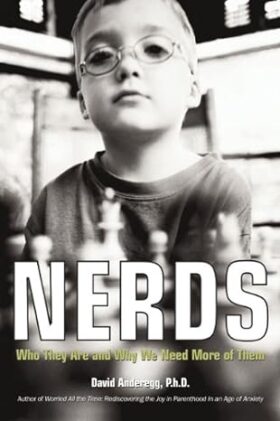
Nerds
Author: David Anderegg
Release: December 27, 2007
Tagline: Who They Are and Why We Need More of Them
Publisher: Tarcher
Genre: Psychology, Pop Culture
ISBN-10: 1585425907
ISBN-13: 978-1585425907
Synopsis: Why are our children so terrified to be called “nerds”? And what is the cost of this rising tide of anti-intellectualism to both our children and our nation? In Nerds, family psychotherapist and psychology professor David Anderegg examines why science and engineering have become socially poisonous disciplines, why adults wink at the derision of “nerdy” kids, and what we can do to prepare our children to succeed in an increasingly high-tech world.
Declassified by Agent Palmer: Did Anderegg’s Nerds reveal Tom Bombadil to be my Shibboleth?
Quotes and Lines
So this book is about the process of stereotype acquisition and the nerd/geek stereotype in particular. But anyone writing about stereotypes needs to come clean about his own attitudes and his own positions about a particular stereotype and stereotyping in general.
*As we shall see, a large part of this story has to with American history and the proper role of schooling in the development of the prototypical American man. Nerds and geeks are male in large part because they are extensions of nineteenth-century stereotypes of what men were supposed to be.
…recent incarnations of a very old American disease: anti-intellectualism. And anti-intellectualism, as I will argue, is very bad for children and even worse for our society as a whole.
…how kids read cautionary tales concocted by adults: They often tend to pay attention to the “Here’s how the world is” part and ignore the “But it can be different” part.
…any action based primarily on envy, nerd-bashing is never logical.
Growing up always involves loss and regret, and for children it also involves anger at those who still get to have what they are losing.
If you had read it [The Lord of the Rings], you were by definition a nerd or geek. But now that it has been made into a lush, easy-to-watch, thrilling movie, it is no longer a nerd shibboleth.
If magic is for losers, what have they lost at?
Status anxiety always makes people eager to “kiss up and kick down,” and children’s peer groups are no exception.
Hostility towards nerds and geeks wastes a lot of human capital and impoverishes everyone in the process.
…in a culture that valorizes youth and hipness at all costs, acting like a grown-up is too much like “thinking old.”
It doesn’t take a rocket scientist to suggest that there might be a link between a virulently anti-intellectual, and especially antiscientific, popular culture and the alarming diminution of science literacy among American kids.
As we have seen in the pages of this book, nerd/geek stereotypes are a complex amalgam of old and new trends in American thought and social organization. They are the new avatars of very old fantasies, with an overlay that is uniquely American and uniquely twenty-first century.